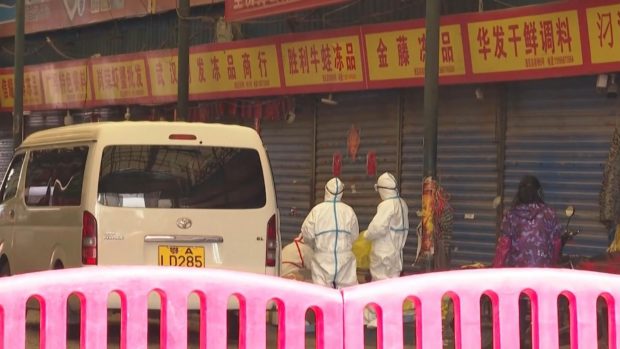China believes new virus behind mystery pneumonia outbreak

The state media reports Thursday, January 9, 2019, that China believes a mysterious pneumonia outbreak that has struck 59 people is due to a new strain of virus from the family of pathogens that includes SARS. CCTV / AFP
BEIJING — China believes a mysterious pneumonia outbreak that has struck 59 people is due to a new strain of virus from the family of pathogens that includes SARS, state media said Thursday.
The infection was first confirmed on December 31 in Wuhan, a central Chinese city with a population of over 11 million, and initially sparked fears about a resurgence of the highly contagious flu-like SARS.
It has also prompted authorities in Hong Kong – badly hit by SARS in 2002-2003 – to take precautionary measures, including stepping up the disinfection of trains and airplanes, including checks of passengers.
An expert team has “preliminarily determined” that a new type of coronavirus is behind the outbreak, lead scientist Xu Jianguo told the official Xinhua news agency.
“A total of 15 positive results of the new type of coronavirus had been detected” in the lab, through tests on infected blood samples and throat swabs, Xu said.
Article continues after this advertisementThe World Health Organization (WHO) said in a statement Wednesday that a new coronavirus could not be excluded as a possible cause of the disease.
Article continues after this advertisementXu said further research was needed on the nature of the outbreak.
China ruled out SARS, which killed hundreds of people more than a decade ago, in a statement on Sunday.
Wuhan’s health commission said on Sunday seven of the 59 patients were seriously ill but none had died. All patients received treatment in quarantine.
Eight patients have recovered and were discharged from the hospital on Wednesday, according to Xinhua.
No patients are known to have died so far.
The commission said the infection broke out between December 12 and 29, with some of the patients employed at a seafood market in the city that has since been closed for disinfection.
No obvious evidence of human-to-human transmission has been found so far, according to the commission’s statement on Sunday.
Footage from January 1 by state broadcaster CCTV showed an official notice at the market saying it had been closed in light of the “current pneumonia situation in our city,” without providing a date for reopening.
The outbreak comes just a few weeks before China’s busiest annual travel period when millions of people take buses, trains, and planes for Lunar New Year.
China’s Ministry of Transport has “made arrangements for disinfection, monitoring, and prevention” focusing on areas with large numbers of passengers, including stations and cargo hubs, the ministry’s chief engineer Wang Yang said at an annual press briefing Thursday.
The country’s civil aviation authority and national railway said at the briefing they had not received any reports of affected patients taking flights or trains, and that they were closely watching the situation.
Wan Xiangdong, chief flight officer of China’s Civil Aviation Administration, said all planes were equipped with emergency medical kits.
Hong Kong, Taiwan fears
In Hong Kong, hospitals have raised their alert level to “serious” and stepped up detection measures including temperature checkpoints for inbound travelers.
Authorities in the financial hub say 38 people have been hospitalized after returning from Wuhan in recent days and displaying flu-like illnesses, but none were confirmed to have contracted the mystery new strain.
Twenty-one of the 38 patients have been discharged, Hong Kong officials said Wednesday.
City residents worried about the outbreak have rushed to buy face masks from local pharmacies, with many selling out earlier this week.
Inbound trains and flights from the mainland are undergoing additional cleaning and disinfection, Hong Kong transport authorities said.
Additional thermal imaging systems have been set up at the city’s airport, while inbound high-speed rail passengers from the mainland face checks by hand-held infrared thermometers.
The upcoming holiday has prompted concerns in Taiwan, where top officials urged the island’s health and welfare ministry to strengthen quarantine controls at airports and plan accordingly.
On Monday, the country’s center for disease control also advised residents planning to travel to or near Wuhan to wear masks and avoid contact with wild animals.
The US embassy in China warned on Tuesday that Americans traveling in the country should avoid animals and contact with sick people.
For more news about the novel coronavirus click here.
What you need to know about Coronavirus.
For more information on COVID-19, call the DOH Hotline: (02) 86517800 local 1149/1150.
The Inquirer Foundation supports our healthcare frontliners and is still accepting cash donations to be deposited at Banco de Oro (BDO) current account #007960018860 or donate through PayMaya using this link.